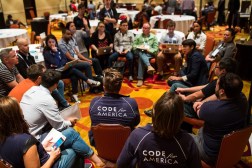Code for America restructures Brigade program with a new National Advisory Council

Correction: This article was updated shortly after initial publication to clarify that Code for America has no immediate plans to reinstate stipends for Brigades.
To quell management and funding concerns within its local chapters, civic tech group Code for America (CfA) elected nine technologists to a newly established National Advisory Council. The move is meant to stabilize CfA’s volunteer-based Brigade program, which has struggled to support its own rapid growth.
Created in 2012, the Brigade program was designed as a way coders and community groups could gather to solve local challenges with digital tools. Yet, the program’s popularity, combined with demand for its services by cities, spurred an unprecedented expansion. In just four years the program grew from 19 initial brigades to now more than 80, with hundreds of volunteers in cities throughout the U.S.
Ultimately, CfA had to freeze funding for its Brigades in 2016, holding back more than a million dollars of support that would have gone toward things like events, travel, national projects and pizza night coding sessions. In February, CfA’s Executive Director announced a 10-month “co-creation process” to decide how the brigades could restructure themselves in a sustainable way. The nearly year-long collaboration gathered input from inside and outside of the organization and finally culminated in the idea of a National Advisory Council to assist in the restructuring of CfA’s grass roots network.
“The National Advisory Council is sort of a first step in transferring some of the ownership of the brigades from a CfA issued program to the community,” said CfA’s Brigade program manager Christopher Whitaker. “Obviously, CfA will continue to support the Brigades, but there is going to be a lot more community involvement in actually running them.”
This involvement is likely to require some funding. Brigades will have to seek support from their local cities, nonprofits and businesses. More mature Brigades, like the city of Oakland, Calif.’s OpenOakland, are already accustomed to such fundraising efforts. However, for newer and smaller brigades, Whitaker acknowledged, the shift may be challenging at first.
The council’s next steps include advising on network-wide funding decisions, needs, and sustainability. Whitaker stipulated that the council’s direction might lead to a distribution of funding different than what the Brigades have been accustomed to.
“We are excited to work with the National Advisory Council on how to make Brigades sustainable long-term,” Whitaker said.
Going forward, Whitaker said the council — a diverse set of Brigade members from across the country — will have two primary goals. The first is for the Brigades to identify where and how they’ll be accountable to the communities they’re serving.
And the second is for the council to articulate a shared vision, a mission statement and narrative to guide future policies, partnerships and a code of conduct for members.
In a blog post about the council, CfA’s Executive Director Jennifer Pahlka, elaborated on these objectives.
“There is so much that still feels up in the air about the future of the Brigade, and the National Advisory Council is going to have to play a huge role in making some decisions that will affect the outcomes for everybody,” Pahlka said. “Their job will be to clarify the purpose of the network, and by extension, its value proposition so that together we can create a narrative that attracts support.”
Since community investments are typically made in return for community outcomes, Pahlka said the Brigades will be required to show their worth in a more granular way. Creating apps won’t just be about proving theories or showcasing what’s possible. Financial support demands results.
“If we’re making apps to help others in our community, are they using them? Are the apps actually helping them? At what scale?” Pahlka asked. “As we take our value proposition to the marketplace(s) we seek support from, we will get these questions and feedback. And that feedback is a gift if we choose to take it as such.”
As for funding models, the council may opt for national support, some combination of national and local, or even, Pahlka said, a system that asks for individual sponsorship, similar to programs like the American Cancer Society’s Relay for Life. If the national funding model is chosen, she said, the group would also have to work toward national outcomes — something that may or may not be in the interest the Brigades’ local goals.
Whatever model is chosen, Code for America has eased its own expectations that Brigades dedicate time and effort to the nonprofit’s national focus areas — community health, economic development, and safety and justice.
“While I think there are a lot of projects that the Brigades do that belong to those areas, I don’t think that’s the primary vision of the program,” Whitaker said. “Every city is different, every city’s priorities are a little different, and we want to make sure that every brigade has enough flexibility to work on those things that are important to their communities.”
The National Advisory Council had its first meeting in October, but Whitaker said the group is still finding its bearings and it will likely be months before any major changes in funding or organizational structure are announced.
“This is going to be a work in progress and there are going to be a lot of things happening,” Whitaker said. “So 2017 looks like it’s going to be an exciting year.”
Code for America’s National Advisory Council
Code for America describes the nine members of its new Brigade National Advisory Council.






